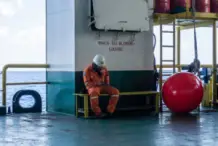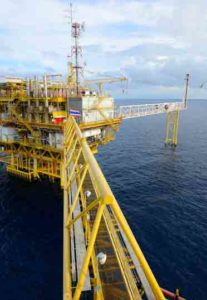
Offshore workers face many risks in the course of their employment. Injuries resulting from offshore accidents range from mild to severe, and the latter can leave victims with a permanent disability, affecting their quality of life. Offshore job injuries can also be fatal.
If you or a loved one suffered maritime injuries while working offshore, a New Iberia offshore injury lawyer will help you file a claim or lawsuit. Financial compensation is available for your emotional and physical trauma from the incident. Contact our client-focused law firm for a free legal consultation.
Offshore Safety Laws
With many people from New Iberia, Louisiana, working on the Gulf Coast on barges, oil rigs, and vessels, it’s important to understand the laws that protect injured workers. We are happy to share our knowledge of maritime laws with all our clients.
The Bureau of Safety and Environmental Enforcement (BSEE) reported two fatalities and 164 injuries among offshore workers in 2021.
Offshore employees work away from or a certain distance from the shore, typically at sea. Therefore, your line of work in the maritime industry may determine your legal options to recover damages.
Louisiana’s Port Security and Safety Plan
The Louisiana Revised Statutes 34 § 340.21 allows each port to determine its security and safety plan. The plans cover all facilities, ships, and employees connected to the port, so it is important to seek the advice of a lawyer familiar with your location.
Offshore workers are among the few groups not eligible for typical workers’ compensation benefits. The main federal law, the Jones Act, will likely cover your claims. However, other laws might apply to your case.
The Jones Act
The Merchant Marine Act, also known as the Jones Act (U.S. Code 46 § 30104), of 1920 is a federal law protecting offshore workers. Under this Act, workers can file a formal lawsuit against their employers if they are hurt.
To be eligible under the Jones Act, you must qualify as a seaman by their definition: a crew member of an offshore vessel on rivers, oceans, or offshore waters. The Jones Act also applies to gas and oil workers.
Offshore vessels include the following:
- Floating barges
- Diving vessels
- Cruise ships
- Tankers
- Drillships
- Cargo vessels
- Fishing boats
- Other work-related water worthy crafts
You may need to file a claim with your employer’s insurance provider. With the Jones Act, you have to prove that negligence caused the offshore accident and, thus, the resulting injuries.
Longshore and Harbor Workers’ Compensation Act
Other federal and state laws, such as the Longshore and Harbor Workers’ Compensation Act (LHWCA), also govern compensation for workers who sustain injuries. This Act provides for the compensation of those who work around the navigable waters of the country.
The covered employees include those in construction, repair, loading, and offloading. However, not all workers can claim compensation under the Longshore Act. A New Iberia workers’ compensation lawyer can determine which Act covers your case.
Laws Governing Offshore Deaths
You may make a legal claim under the Death on the High Seas Act (DOHSA) for the wrongful death of a loved one. This federal law was passed by Congress in 1920 to compensate the families of seafarers who died due to negligence or wrongful acts on the high seas.
These offshore safety laws are in place to ensure your employer provides a safe work environment. Any negligence that leads to an accident and subsequent injury is typically covered under law or statute.
A New Iberia offshore injury attorney at our firm can help determine under which laws you can pursue a compensation claim.
Laborde Earles injury was great for me they took care of me very fast and professional. If for any reason I need legal help they will be who I use.
ClientAre You Eligible for Compensation in Your Offshore Injury Case?
Besides qualifying as a seaman under the Jones Act, your accident must also result in a severe or permanent injury or disability. In addition, you could be eligible for compensation if your offshore accident in the workplace resulted in health-related conditions.
Compensation You Can Pursue
Based on the nature of your job and your injury, there are different types of damages you can seek compensation for, including:
- Past and future medical care costs, including doctor visits, surgical procedures, diagnostic testing, medication, physical therapy, and medical equipment
- Lost wages during the period when your recovery process prevented you from working
- Pain and suffering due to the mental, emotional, and physical toll of the accident
If you are making a claim due to your loved one’s wrongful death, you may be eligible to receive compensation for these expenses and non-economic losses:
- Their medical care
- Funeral and burial costs
- Awards for loss of companionship
- Loss of consortium
I thank God for Digger & David. I don’t know what we would have done if it hadn’t have been for them.
Rick Smith | ClientFiling a Claim Under the Jones Act
There are multiple steps involved in filing an offshore injury claim. First, you and your lawyer will confirm your eligibility under the Jones Act and prove your status as a seaman.
Additional steps to filing a claim can include:
- Filing a claim with your employer’s insurance company
- Providing proof of your damages and injuries
- Showing that your work-related injuries were a result of negligence by your employer or by a crew member
Other laws and statutes protect offshore workers even if your situation doesn’t fall under the Jones Act. Your lawyer can explain what laws apply to your circumstances. We offer our clients all the information they need to make informed decisions about their cases.
Things to Prepare
The severity of your accident will determine your compensation levels. However, the evidence you prepare also influences your claim. When possible, make sure to collect these items:
- A copy of the accident report
- Notes and contact details from witnesses
- Medical bills related to your workplace injury
- Medical reports linking your injury to the accident
- Out-of-pocket receipts, including medication and transportation expenses
The reassurance from Digger and his staff gave me that renewed hope that it’s going to be okay down the road.
ClientOffshore Injury Statute of Limitations
The statute of limitations is the timeframe you have to file a formal civil lawsuit. Typically, personal injury lawsuits must be filed within one year of the incident date, and employers must be notified within one month. However, this timeframe is different under maritime law.
The Jones Act statute of limitations is covered under U.S. Code 46 § 30106. It states that individuals must file a formal civil action within three years of the incident. However, not all offshore workers qualify under the Jones Act. An offshore injury lawyer from our firm serving New Iberia and all of Louisiana can help ensure your case complies with the statutory deadline.
They treated us like no other people would. Whenever we needed something they were there for us. I put my trust in them and I don’t regret it.
ClientCommon Offshore Injuries and Their Causes
Offshore workers are exposed to a high risk of injury due to the hazardous nature of their work environment. Thus, you may experience a variety of offshore injuries.
Amputations
Working with heavy machinery can be dangerous, and one common hazard is the risk of lacerations and broken bones.
Workers may lose a limb in an offshore accident in more severe cases. Such a severe injury will alter the course of your life. For example, your hand can get trapped in the various equipment used in your work, which might result in amputation.
Back Injuries
Back injuries frequently occur in offshore accidents, especially when slipping and falling on a hard surface. Sometimes, the victim may fall from a high spot, worsening the injury.
Spinal cord injuries are a more severe condition that requires a long recovery time, during which you may be unable to work.
Burns
Fires and explosions can happen in offshore work, burning the victims. They may result from poorly maintained equipment or welding-related accidents. Recklessness and human error can lead to such dangerous situations.
An employer must ensure that you have safe working conditions. Failure to do so may constitute negligence. A New Iberia offshore injury lawyer can help you prove if an accident resulted from negligence by your employer.
What You Can Do After an Offshore Accident
If you or someone you know has been involved in an offshore accident, it can be a confusing and overwhelming time, with numerous legal and financial considerations to navigate. However, whatever law your workplace accident case falls under, there are certain steps you should take.
Get the Necessary Treatment
After an offshore accident, the first thing you should do is get medical help. However, getting prompt medical support can pose a problem due to the remote nature of the job site. If you are out in the water, you may receive first aid before getting to a healthcare facility.
Your accident could occur on land in a location adjoining navigable waterways. In this case, those working with you can take you to the hospital. The doctor will include the extent of your injuries in your medical records.
Let Your Employer Know
In the Jones and Longshore Acts, reporting an injury is crucial to obtaining compensation. Under the Jones Act, you must report the accident to your employer within seven days.
Under the Longshore Act, you have 30 days to report the incident. Failure to report your claim can put your chances of compensation at risk. The insurance provider may view your case as not so serious if you miss the reporting period.
Take Photos, Witness Statements, and Save Receipts for Evidence
To file for compensation under the Jones Act, you must show that your employer is responsible for your accident and that the incident led to injuries and damages. You must present proof of these two conditions by:
- Gathering photo evidence: Take pictures of the hazard that caused the accident.
- Obtain testimonies: Get statements from witnesses, particularly fellow offshore workers.
- Maintain medical records: Medical records are crucial to demonstrate the severity of your injury, and documenting the challenges you face due to the accident is important.
- Record challenges you experience: Record the challenges you face as a result of the accident.
- Document expenses: Keep receipts for treatment costs and other expenses related to the accident.
- Safeguard records: Store all records and receipts securely. These documents will support your offshore accident lawyer in proving your case.
- Show that you worked during the accident: Demonstrate that you worked when the incident occurred. This establishes eligibility for benefits under the Longshore Act.
- Seek legal assistance: Offshore injury attorneys can provide further guidance and help you gather additional evidence to strengthen your case.
Consider Working With an Offshore Accident Lawyer in New Iberia, LA
Our law firm has extensive experience and knowledge in handling offshore accident cases. We understand the unique complexities and challenges of maritime law and offshore accident claims.
Our team of skilled attorneys is well-versed in the laws and regulations governing offshore accidents, including those related to the Jones Act, Longshore and Harbor Workers’ Compensation Act, and general offshore law.
Our firm has also successfully represented clients in a wide range of offshore accident cases and personal injury claims, including those involving oil rigs, offshore drilling platforms, supply vessels, crew boats, and other offshore vessels.
Our expertise covers various offshore accident types, including vessel collisions, falls, equipment failures, explosions, fires, and other incidents resulting in serious injuries or fatalities.
Our offshore accident attorneys diligently investigate, gather evidence, determine liability, and pursue maximum compensation for our clients.
Speak to a New Iberia Offshore Accident Lawyer Today
Offshore injuries can impact your life significantly, and the legal processes can be confusing. However, you don’t have to navigate the situation alone and take on the financial burdens that compensation can relieve.
At Laborde Earles, we prioritize the needs and well-being of our clients. Our offshore accident attorney in New Iberia, LA, will handle all legal aspects of your case while you recover.
Learn more about your legal options by calling our law firm today so our team can get started on your case. Our experienced attorneys work on a contingency fee basis, so you owe us nothing unless we secure a settlement or court award for you. Contact us to discuss the details of your case.



